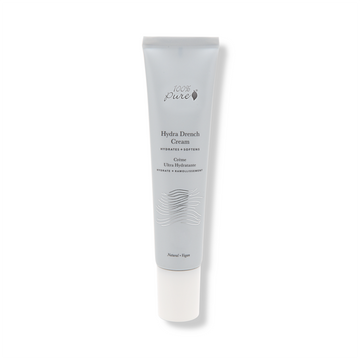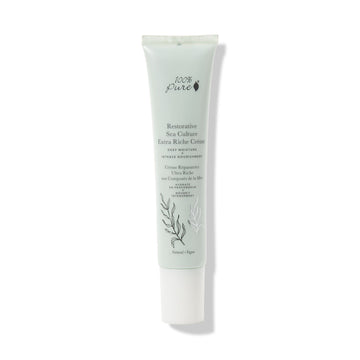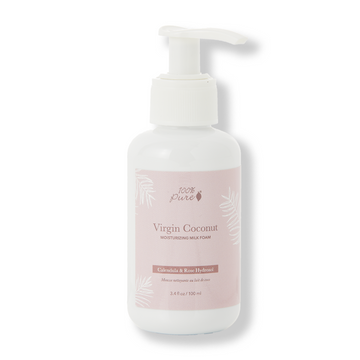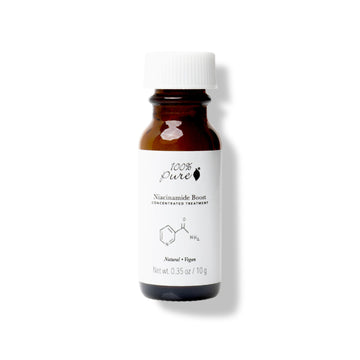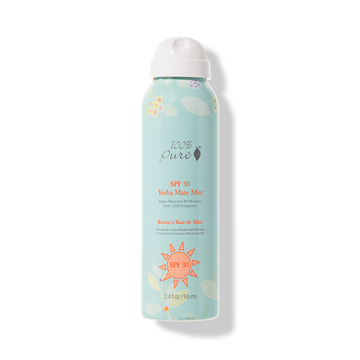The Ultimate Guide to Healing Your Skin Barrier Quickly
Posted on February 10, 2025 Written by: 100% PURE®
We typically react quickly to age spots or spotting laughter lines on our reflection, but as close as we get to the mirror, it won’t show one crucial skin factor - our skin barrier. If you’ve been experiencing redness, dryness, or sudden breakouts but gave those issues the backseat to antiaging concerns, your skin might be crying out for you to ‘take the wheel’ on them.
The skin barrier is the first layer of defense and the driving force behind optimal skin health. A damaged barrier can lead to irritation, moisture loss, and increased sensitivity, making your skincare routine ineffective. Unfortunately, many people suffer from a compromised skin barrier without even seeing or realizing it, leading to common skin problems and a reflection of frustration.
No more beckoning, “Mirror, mirror, on the wall,” when you have us to guide you in repairing your skin barrier quickly with hydration, gentle skincare, and the best moisturizer to restore balance and harmony. Let’s delve under the surface to learn the telltale signs of a compromised skin barrier and how to fix it fast with expert-approved remedies. It’s time to steer your skin back to its former glory.

What Is the Skin Barrier, and Why Is It So Important?
“Mirror, mirror, on the wall”: What is the skin barrier and what does it do, after all?
To answer, it helps to understand how our skin is structured and what magical role the skin barrier plays in our skin.
Understanding the Skin Barrier
The skin consists of three main layers: the topmost layer, or epidermis, the middle layer, or dermis, and the bottom layer, or hypodermis. The skin barrier, or stratum corneum, is the top layer of the epidermis and your skin’s first line of defense. Think of the epidermis as a shield and the stratum corneum or skin barrier as the resistant cover coating it.
The skin barrier safeguards your skin from external threats like pollution, bacteria, and UV rays. It’s composed of tightly packed cells and lipids (fats), which all form the skin’s natural moisturizing factor. Natural moisturizing factors are key in keeping the skin hydrated and healthy by locking in moisture and preventing water loss.
When your skin barrier gets damaged, it can't do its job properly, leading to various skin issues. Signs of a damaged skin barrier include dryness, where the skin feels tight and may start to peel, and redness, which indicates inflammation and irritation. Increased sensitivity is another common sign, making your skin more reactive to products and environmental factors. Other indicators include premature aging, dullness, itchiness, and a higher incidence of breakouts or other blemishes.
Why a Healthy Skin Barrier Matters?
When your skin barrier is healthy, it helps maintain that glowing, ‘fairest skin of all’ complexion we all strive for, and it can perform its noble duties. While the skin barrier performs various roles, it carries out three main functions: retaining moisture, transporting nutrients, and protecting the rest of your skin from the environment around it.
Besides being a major determinant of your skin’s health and appearance, the skin barrier also carries out various other vital functions for the skin.
Maintains hydration and prevents dehydration
Hydration is crucial for optimal barrier function. The skin barrier maintains hydration by trapping moisture within the skin and preventing it from evaporating too quickly, thus preventing dehydration.
Protects against bacteria, allergens, and environmental damage
The skin barrier protects against bacteria, allergens, and environmental assailants by acting as a physical shield composed of tightly packed cells and lipids. It prevents outdoor pollutants and microbes from penetrating deeper into the skin, keeping it in healthy harmony.
Keeps skin smooth, firm, and resilient
A skin barrier without optimal hydration is more susceptible to dryness, which exasperates the appearance of fine lines and wrinkles. It is also more vulnerable to environmental damage, leading to the appearance of fine lines and wrinkles and a loss of elasticity and plumpness. Well-hydrated skin is more resilient, firmer, and smoother.
Signs Your Skin Barrier Is Damaged
When your skin barrier becomes damaged, it’s all too easy to (quite literally) feel uncomfortable in your own skin. A compromised skin barrier can't perform its protective functions effectively, leading to various skin issues. You might notice redness, dryness, product sensitivities, and more!
Excessive Dryness & Flakiness
When your skin barrier is damaged, it struggles to retain moisture, leading to dryness. Dry skin may appear dull with more pronounced fine lines and wrinkles. The skin may feel tight, itchy, and prone to flaking or peeling. This dryness is not just a surface-level concern; it reflects a deeper inability of the skin to hold onto essential moisture, necessitating a more nurturing and moisture-rich skincare routine.
Increased Sensitivity & Redness
Damaged skin barriers are more susceptible to irritation, leading to redness and increased sensitivity. This can be exacerbated by environmental factors, harsh skincare products, overuse of exfoliants, or stress. It's crucial to use gentle, soothing formulas that reduce irritation and help the skin barrier recover.
Burning or Stinging Sensation When Applying Skincare
A burning or stinging sensation when applying skincare usually indicates irritation or a reaction to the product, potentially due to a compromised skin barrier. If your skin is already irritated or has a weakened skin barrier, even gentle products that previously didn't cause issues can sting or be irritating.
Sudden Breakouts or Irritation
When your skin barrier is compromised, it becomes more susceptible to irritation, inflammation, and breakouts due to a weakened protective layer, allowing irritants to penetrate more easily. In some cases, a damaged skin barrier can trigger an overproduction of oil, leading to oily or greasy skin.
Tightness & Rough Texture
A feeling of tightness and a rough texture on your skin are strong indicators of a damaged skin barrier, which can lead to moisture loss and visible signs of dryness and irritation; this can often feel like your skin is very tight on your face, especially if accompanied by flakiness, visible dryness or a rough texture.
As mentioned earlier, it’s crucial to use gentle, moisturizing formulas on a damaged skin barrier that reduce irritation and help the protective barrier recover. The 100% PURE Hydra Drench Cream is formulated to deliver deep hydration, replenishing the skin's moisture levels and helping repair damage to the barrier.
What Causes Skin Barrier Damage?
If any signs of a damaged skin barrier we just covered sound familiar, your skin barrier might need some TLC-M - and moisture! Recognizing the symptoms of a compromised barrier or covering things you should avoid to protect it are the first steps toward repairing and strengthening your skin barrier so you can get back to having healthy, radiant skin.
Over-Exfoliation & Harsh Skincare Products
Excessive use of AHAs, BHAs, and retinoids can strip the skin barrier:
Many people believe that the more they exfoliate with AHAs or BHAs, the brighter and smoother their skin will be. While exfoliation is important for removing dead skin cells and promoting cell turnover, over-exfoliation can damage the skin barrier, stripping your skin of its natural oils and weakening the protective barrier. This can lead to increased sensitivity, dryness, and irritation.
Retinoids can strip the skin barrier by accelerating skin cell turnover, which disrupts the natural balance of the skin's top layer, causing the cells to shed too quickly. The rapid cell turnover can disrupt the lipids and proteins that hold the skin cells together, weakening the barrier.
Harsh cleansers and alcohol-based toners worsen sensitivity:
A clean face is the foundation of any skincare routine, but using a harsh cleanser can strip your skin of its natural oils, leaving your skin barrier compromised. Many traditional cleansers contain harsh sulfates, synthetic fragrances, and skin-drying alcohol, which can disrupt your skin's pH balance and weaken its natural defenses.
When your skin barrier is damaged, you may notice increased dryness, irritation, and sensitivity. Over time, your skin may become more prone to breakouts and inflammation as it struggles to protect itself from external irritants.
Lack of Hydration & Moisture
Dehydration weakens the skin’s ability to retain moisture:
When your body lacks sufficient water, your skin becomes more prone to dryness, irritation, and inflammation. Dehydrated skin is also less capable of repairing itself, leading to a compromised skin barrier.
Dehydration significantly weakens the skin's ability to retain moisture, causing it to appear dry, flaky, and tight due to a compromised skin barrier that allows moisture to escape more readily; essentially, when dehydrated, the skin cells lack water and cannot function optimally to hold onto moisture.
Skipping moisturizer leads to a compromised skin barrier:
Skipping moisturizer might seem like a good idea if you have oily or acne-prone skin, but it’s actually one of the worst things you can do for your skin barrier. Your skin needs hydration to maintain a healthy barrier, and skipping moisturizer can cause your skin to overcompensate by producing even more oil.
A damaged skin barrier struggles to retain moisture, leading to transepidermal water loss (TEWL). This results in dryness, flakiness, and irritation. It’s crucial to use a deeply nourishing moisturizer, which acts as a protective layer, locking in hydration and supporting your skin’s natural defenses.
For intense hydration, the 100% PURE Restorative Sea Culture Extra Riche Créme is a rich, luxurious face cream that drenches skin with deep moisture while delivering nutrient-rich sea minerals, antioxidants, amino acids, vitamins, and other beneficial trace elements for a healthier, softer complexion. Skin-plumping seaweed polysaccharides and red algae lock in long-lasting hydration for abundantly supple, nourished skin.
Environmental Damage (Pollution & UV Rays)
Free radicals from pollution break down collagen and weaken the skin barrier:
Free radicals from pollution damage collagen and weaken the skin barrier by causing oxidative stress, which essentially means they disrupt the balance of electrons within skin cells, leading to the breakdown of important structural proteins like collagen and elastin, resulting in loss of skin elasticity and firmness, and a compromised barrier function that can leave the skin more susceptible to irritation, dryness, and premature aging.
UV exposure speeds up moisture loss and causes premature aging:
UV rays are one of the most significant contributors to skin barrier damage. UV exposure speeds up moisture loss and causes premature aging by damaging the skin's barrier function, breaking down key structural proteins like collagen and elastin. This accelerates skin aging, and leads to a loss of skin elasticity, wrinkles, and photoaging.
Stress, Diet, & Lifestyle Choices
Poor nutrition and high stress levels trigger inflammation:
Poor nutrition and high stress levels trigger inflammation in the skin barrier by causing an increase in cortisol, a stress hormone, which disrupts and weakens the skin's natural barrier function. This allows irritants to penetrate the barrier more easily. Additionally, a diet lacking essential nutrients like antioxidants and healthy fats can further weaken the skin barrier, making it more susceptible to inflammation, dryness, and irritation.
Lack of sleep disrupts the skin’s natural repair cycle:
At night, the skin conducts a natural repairing activity to reverse damage suffered during the day. The body's natural sleep-wake cycle, or circadian rhythm, regulates when skin repair processes occur, and when sleep is disrupted, this rhythm is thrown off, hindering the optimal timing for skin cell turnover.
As a result, the skin will appear duller, with increased wrinkles and a weakened skin barrier.
How to Fix Your Skin Barrier Fast
When your skin barrier becomes damaged, it’s all too easy to (quite literally) feel uncomfortable in your own skin. Luckily, the skin barrier can repair itself over time, and there are ways we can help the process go faster!
Following these 10 steps is crucial for creating a functioning skin barrier because they collectively address key aspects of barrier health and repair:
Switch to a Gentle Cleanser
Avoid sulfates and harsh foaming cleansers:
Using a harsh cleanser can strip your skin of its natural oils, leaving your skin barrier compromised. Many traditional cleansers contain harsh sulfates, synthetic fragrances, and skin-drying alcohol, which can disrupt your skin's pH balance and weaken its natural defenses.
Look for hydrating, pH-balanced formulas:
The foundation of a healthy skin barrier starts with how you cleanse your skin. Using a gentle cleanser like our Virgin Coconut Moisturizing Milk Foam ensures that your skin is cleansed without stripping away its natural oils. Harsh cleansers can remove essential lipids and proteins that make up the skin barrier, leading to dryness and irritation. This product is particularly beneficial as it provides a thorough cleanse while maintaining the skin's moisture balance, leaving it soft and protected.
Use a Barrier-Repairing Moisturizer
Look for ceramides, hyaluronic acid, and plant oils to restore hydration:
Adding products with barrier-repairing ingredients like ceramides, hyaluronic acid, and fatty acids is essential for skin health. These ingredients work by replenishing the lipids in the skin and reducing inflammation, thereby enhancing the skin’s ability to retain moisture, restore hydration, and protect against environmental stressors.
Avoid fragrances and drying alcohols that worsen irritation:
Steer clear of synthetic ingredients, alcohol-based products, and fragrances. Ingredients like alcohol and fragrances can be extremely irritating and drying to the skin, leading to a compromised barrier. These components can strip the skin of its natural oils and disrupt the lipid balance, making it more susceptible to damage.
Opting for gentle, fragrance-free products helps maintain the skin’s natural defenses and promotes a healthier, more resilient barrier. The best moisturizer is the 100% PURE Hydra Drench Cream, which is packed with hyaluronic acid and sea minerals to strengthen the skin barrier. Well-hydrated skin is more resilient and better able to defend against external aggressors. By incorporating a rich, hydrating cream into your daily routine, you can help reinforce the skin barrier and keep your skin healthy and supple.
Skip the Exfoliation (Temporarily!)
Pause retinoids, AHAs, and BHAs until your skin heals
While exfoliation is important for removing dead skin cells and promoting cell turnover, it can damage the skin barrier, especially if the barrier is already weak. Retinoids can strip the skin barrier by accelerating skin cell turnover, which disrupts the natural balance of the skin's top layer, causing the cells to shed too quickly. AHAs and BHAs strip your skin of its natural oils and weaken the protective barrier. This can lead to increased sensitivity, dryness, and irritation. It’s best to pause using any of these until your skin barrier heals.
Reintroduce them slowly once the barrier is repaired
When your skin barrier is damaged, it's important to avoid harsh exfoliants and instead, gradually reintroduce them back into your skincare routine once the barrier has healed, starting with gentle options and using them less frequently to prevent further irritation.
Apply a Hydrating Serum with Niacinamide & Hyaluronic Acid
Niacinamide calms inflammation and strengthens the skin:
When shopping for barrier repair products, check for ingredients that can help restore the skin barrier, like niacinamide. Also known as vitamin B3, niacinamide is a versatile ingredient that enhances the skin barrier function. It improves skin texture, boosts moisture retention, and reduces sensitivity, making it a great all-rounder for barrier support.
Hyaluronic acid boosts hydration and plumps the skin:
Known for its incredible ability to hold up to 1,000 times its weight in water, hyaluronic acid is a hydration hero. It deeply moisturizes the skin, helping to maintain its moisture balance and keeping the barrier intact and functioning optimally.
For a skin-barrier boost of hydration and repair, the 100% PURE Niacinamide Boost is designed to restore youthful texture and tone with a concentrated dose of vitamin B3 powder and hyaluronic acid. Niacinamide minimizes redness and restores skin from past environmental damage, while hyaluronic acid deeply hydrates and replenishes thirsty skin for a rejuvenated glow.
Protect with SPF Every Single Day
UV exposure weakens the skin barrier further—daily SPF is non-negotiable
Wear SPF every day to protect your skin from harmful UV rays. Pollution and harsh weather can also damage your skin barrier, so make sure to shield your skin with protective products.
Choose a broad-spectrum mineral sunscreen
UV rays are one of the most significant contributors to skin barrier damage. Regular use of sun protection, like the Yerba Mate Mist SPF 30, is essential for maintaining a healthy skin barrier. This product hydrates skin and provides a broad-spectrum SPF to shield your skin from harmful UV rays, preventing damage that can weaken the barrier. Consistent sun protection helps maintain the integrity of the skin barrier and prevents premature aging and sensitivity.
How Long Does It Take to Repair the Skin Barrier?
The time it takes to repair a compromised skin barrier can vary depending on the severity of the damage and the care regimen followed. Typically, it can take anywhere from a few days to several weeks.
Mild damage: A few days to a week with the right hydration and care
Severe damage: 2-4 weeks for full restoration
Consistency is key—stick to a gentle, nourishing routine of gentle, hydrating products and avoid irritants to facilitate recovery.
FAQs About Skin Barrier Repair
What are the signs of a damaged skin barrier?
A damaged skin barrier often shows symptoms like redness, inflammation, dryness, and flakiness, indicating the skin's impaired ability to retain moisture. You may feel itchiness or a burning sensation, along with increased sensitivity to skincare products. The skin might appear rough with an uneven tone, and could experience breakouts due to compromised protection against bacteria. Tightness, especially post-cleansing, and frequent irritation from environmental factors like wind or sun are also common signs.
What ingredients should I avoid to prevent further damage to my skin barrier?
To prevent further damage to your skin barrier, avoid the following ingredients: Harsh surfactants (e.g., sodium lauryl sulfate) Alcohol-based products (e.g., denatured alcohol, ethanol) Fragrances and essential oils (e.g., lavender, citrus oils) Physical exfoliants (e.g., walnut shell powder, sugar scrubs) Harsh chemical exfoliants if used excessively (e.g., high concentrations of AHAs/BHAs) Certain preservatives (e.g., formaldehyde-releasing agents) Strong retinoids (especially in high concentrations without proper guidance).
What lifestyle changes can support a healthy skin barrier?
Supporting a healthy skin barrier involves incorporating both skincare practices and lifestyle changes. Hydration is key, so make sure to drink plenty of water to keep your skin moisturized from within. A balanced diet rich in omega-3 fatty acids, antioxidants, and vitamins also supports skin health. Daily use of sunscreen is essential to protect your skin from UV damage. Avoid over-washing and use mild, pH-balanced cleansers to prevent stripping your skin of its natural oils. Managing stress through activities like yoga or meditation can also positively impact your skin.
How can diet and hydration impact the health of my skin barrier?
Diet and hydration significantly impact skin barrier health. Drinking enough water helps maintain skin hydration. Consuming healthy fats like omega-3 and omega-6 fatty acids, found in fish and nuts, improves skin hydration and barrier integrity. Antioxidant-rich foods, such as fruits and vegetables high in vitamins A, C, and E, which protect the skin from damage and support repair. Adequate protein intake provides amino acids essential for skin repair. Avoiding inflammatory foods, like high sugar and processed items, reduces skin inflammation.
How long does it take to repair a damaged skin barrier?
The time it takes to repair a damaged skin barrier can vary based on the severity of the damage and the care taken to repair it. On average, with consistent and appropriate skincare, it can take anywhere from two weeks to several months. Mild damage may improve in a couple of weeks, while more severe damage may take up to three months or longer.
Final Thoughts: Heal & Strengthen Your Skin Barrier for Radiant Skin
Maintaining a healthy skin barrier is essential for overall skin health. A robust skin barrier protects against environmental stressors, locks in moisture, and ensures your skin remains smooth, hydrated, and glowing. Recognizing the signs of a compromised barrier, such as dryness, redness, and increased sensitivity, is the first step toward addressing and preventing these issues.
It’s important to switch to a gentle, hydrating skincare routine and give your skin the care it needs. 100% PURE offers a range of natural products specifically designed to support and protect your skin barrier. Explore our ultra-hydrating skincare range to promote a strong, youthful complexion and give your skin the care it deserves.
So, “mirror, mirror, on the wall, who is the fairest of them all? Why it’s you, and only you! And you have the power to drive change for your skin barrier today!
- Tags: February-2025
We carefully hand-select products based on strict purity standards, and only recommend products we feel meet this criteria. 100% PURE™ may earn a small commission for products purchased through affiliate links.
The information in this article is for educational use, and not intended to substitute professional medical advice, diagnosis, or treatment and should not be used as such.













